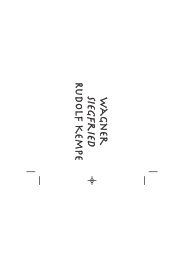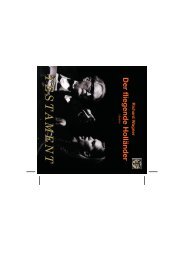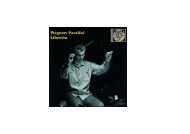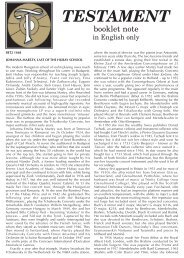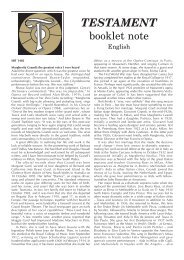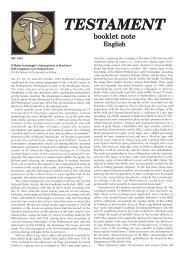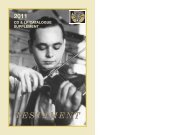You also want an ePaper? Increase the reach of your titles
YUMPU automatically turns print PDFs into web optimized ePapers that Google loves.
efused. In 1956 Wieland and Wolfgang Wagner had holes<br />
bored and slits made in the cowl but admitted to the press<br />
after the opening night of Parsifal that they had failed: ‘1-0<br />
to Richard Wagner and his Festspielhaus’, commented<br />
Wolfgang. A request for similar action was made by Solti<br />
(and refused) during his only appearance at the Festival in<br />
1983. Small adjustments (not affecting the visibility of the<br />
orchestra) were made later, however, at the request of<br />
Daniel Barenboim.<br />
In 1951 Herbert von Karajan (and Walter Legge, who<br />
was recording his performances for Columbia/EMI) started<br />
to reseat the orchestra along more conventional lines (the<br />
effects of this can be heard on their Meistersinger<br />
recording). Although this appeared not to be a success,<br />
Karajan went even further next year for his Tristan<br />
performances but, as late as after the general rehearsal,<br />
yielded to persuasion from orchestra members and the<br />
Wagner grandsons to return to Richard Wagner’s original<br />
plan.<br />
Note: the rushing sound that can be heard on this<br />
performance during the descent to and return from<br />
Nibelheim may come from the Mixtur-Trautonium, an<br />
electronic instrument designed by Oskar Sala for the<br />
composer Carl Orff and, at the latter’s suggestion, used at<br />
Bayreuth in this and subsequent years to simulate the<br />
offstage musical effects of the Rheingold anvils and the<br />
Parsifal bells.<br />
� Mike Ashman, 2006<br />
THE SINGERS<br />
Hans Hotter (Wotan) was born on 19 January 1909 in<br />
Offenbach am Main, Germany. He studied with Matthäus<br />
Römer in Munich and worked as an organist and choirmaster<br />
before making his opera début at Troppau in 1930<br />
as the Speaker in Die Zauberflöte. After singing with the<br />
companies in Breslau and Prague, he joined the Hamburg<br />
Opera in 1934 and then moved to the Munich Opera in<br />
1937. There he built up his repertoire of Wagnerian roles<br />
and appeared in the world première of Friedenstag by<br />
Richard Strauss in 1938. Four years later he was in another<br />
Strauss première, that of Capriccio, as Olivier, and what<br />
should have been his third creation, Jupiter in Die Liebe<br />
der Danae at the 1944 Salzburg Festival, went unrealised<br />
when Hitler ordered all theatres to be closed, though the<br />
dress rehearsal did take place. Hotter had previously made<br />
his Salzburg début in 1942 as Count Almaviva in Le nozze<br />
di Figaro. His international career had begun in 1939<br />
when he sang the Wanderer at La Scala, but the war<br />
prevented further excursions. When peace returned, he<br />
sang Don Giovanni and Almaviva at Covent Garden<br />
<strong>TESTAMENT</strong><br />
booklet note<br />
English<br />
during the Vienna State Opera’s visit in 1947. He was<br />
heard in Wagner at the Teatro Colón in Buenos Aires in<br />
1948 and the Metropolitan in New York in 1950 and<br />
continued to extend his international career with marked<br />
success. He was also a regular visitor to Bayreuth, where<br />
he sang between 1952 and 1966 and his Wagner<br />
portrayals could be seen in many important houses and<br />
festivals. He sang regularly at Covent Garden from 1947<br />
until 1963. His concert career flourished too, with Lieder<br />
recitals an important part of his musical activities. For<br />
more than 20 years, Hotter also undertook some opera<br />
production. He produced the Ring cycle at Covent Garden<br />
in the 1960s, and was responsible for other productions in<br />
Vienna, Munich, Hamburg, Zurich and Dortmund. Most of<br />
these were of Wagner operas, but there were some others,<br />
and his final production, in Chicago in 1981, was Fidelio.<br />
Late in his career, Hotter was also lauded for his<br />
interpretation of Moses in Schoenberg’s opera Moses und<br />
Aron. He officially retired from the stage in Vienna in 1972<br />
in the role of the Grand Inquisitor in Verdi’s Don Carlo.<br />
After his retirement, he still occasionally appeared in small<br />
parts. His performance of Schigolch in Berg’s Lulu at San<br />
Francisco in 1989 and again in Paris in 1991 received<br />
particular critical acclaim, and just after his 80th birthday<br />
he was the Speaker in two performances of Gurrelieder at<br />
the Royal Festival Hall in London. He died in Munich on 8<br />
December 2003.<br />
Georgine von Milinkovič (Fricka) was born to Croatian<br />
parents in Prague on 7 July 1913 and died in Munich on<br />
26 February 1986. She studied in Zagreb and Vienna prior<br />
to making her début in 1937 in Zurich, and she moved on<br />
the Bavarian State Opera in Munich in 1940. In 1941, she<br />
caused a sensation as Kundry in a Dutch Radio<br />
performance of Parsifal. Following the war, she sang at the<br />
Prague Opera for three years and expanded her career<br />
throughout Europe. She appeared at many of the major<br />
festivals including Bayreuth, Salzburg, Holland and<br />
Edinburgh. She was also a favourite at the Royal Opera<br />
House, Covent Garden, and the Vienna State Opera. She<br />
remained on the roster of both the Bavarian and Vienna<br />
State Opera companies until 1968.<br />
Rudolf Lustig (Loge) was born in 1902 in Vienna, where he<br />
studied with Hermine Geyer prior to beginning his career<br />
in 1933 at the National Theatre in Weimar in the title role<br />
in Les Contes d’Hoffmann. Following the war, he moved<br />
on to heavier dramatic parts in performances spanning the<br />
globe, often appearing with the major stars of the day,<br />
including Birgit Nilsson, to whose Isolde he was a frequent<br />
Tristan. He also made several appearances with his wife,



